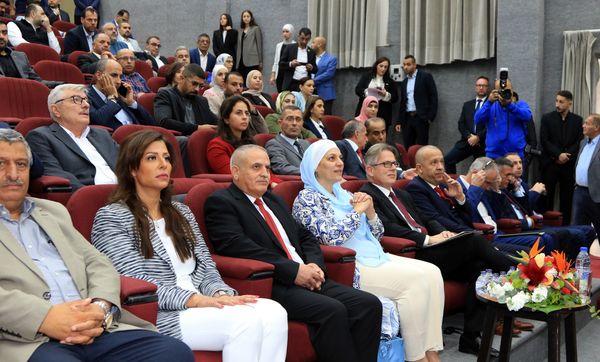- Local News
- Web-2022-11-02 | 05:34 pm

Nayrouz News Agency :
Under the patronage of HRH Princess Basma Bint Ali, Chairperson of the Board of Trustees of the Hashemite Fund for the Development of the Jordan Badia, the launch of the Smart Desert Company, a subsidiary of the Smart Desert Project, took place today, Wednesday, at the National Center for Agricultural Research.
The project manager, Engineer Ali Al-Hayajneh, said that the Smart Sahara Company is a non-profit company, funded by the French Development Agency, established within the Smart Desert project. To enable farmers and home-based entrepreneurs economically by creating the appropriate environment for production and assisting the target groups in planning their projects and marketing their crops and agricultural products.
He added that the launch of the company came to link farmers and home projects with local and international markets, and to provide technical advice, which comes as a reliable party to communicate and contract with various parties, and to find all modern ways of competition and creativity.
Al-Hayajneh pointed out that the most important challenges facing the agricultural sector in Jordan are the problem of marketing, especially for crops and products of small farmers who are always subject to marketing difficulties and fluctuations in prices, pointing out that the company came to work on integrating project beneficiaries with agreements to market their products with major local and international markets before Planning and starting farming.
The French Ambassador to Amman, Alexis Grandmaison, explained that the project seeks to improve the living conditions of agricultural workers to increase their income, achieve stability, economic and social development, and enable young people to obtain technical support, estimating the number of beneficiaries of the project at about 6,000 people and 15,000 trainees.
The director of the Smart Desert Company, Eng. Thabet Haswa, said: "The agricultural production plan starts from studying the local and foreign markets to develop appropriate plans for farmers and work to ensure their success to ensure obtaining the largest possible return, work to increase agricultural diversity, and not rely on traditional crops.
And the Assistant Director-General of the National Center for Agricultural Research for Scientific Research Affairs, Dr. Naim Mazahreh, indicated that the center is an incubator for pioneering projects that contribute to empowering farmers and rural families, in addition to conducting agricultural research and employing scientific research outputs to develop the agricultural sector and bring about sustainable development.
Today, agreements were signed with several parties to be a building block for agricultural projects aimed at serving the local community and achieving the vision of His Majesty King Abdullah II and the goals of the Smart Desert Project.
On the sidelines of the celebration, the Smart Desert Company signed cooperation agreements with the Hashemite Fund for the Development of the Jordanian Badia, Al Sarhan Municipality, Dar Abu Abdullah Association, the Palestinian Jordanian Agricultural Marketing Company, the Mafraq Development Company, and the National Center for Agricultural Research, as central partnerships with the aim of achieving the goals of the Smart Desert project. Achieving the benefit of the beneficiaries and members of the local community.
It is noteworthy that the Smart Desert project is a project funded under the "MINCA" Fund for Peace and Resilience, which is dedicated to reducing the vulnerabilities and long-term effects of the Syrian refugee crisis in the host countries. France has allocated, through the French Development Agency, a grant of 10 million euros to the project. ; With the aim of making a quantum leap in the agricultural sector through economic empowerment of the targeted groups of Jordanians and Syrian refugees in the agricultural sector in the northern and eastern Jordanian highlands.
The project will work on using and adapting smart and sustainable technologies to develop the agricultural sector at all stages of production and supply chains of the product to the final consumer, maximizing the added value and ensuring raising the efficiency of water use in agriculture, in addition to the use of non-conventional water.









